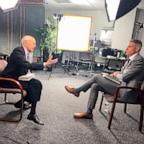Mossad Agent, Hairstylist ... Diplomat?
Writer Robert Smigel calls for peace through comedy with "Zohan."
June 5, 2008 -- A comedy with political undertones — or vice versa — could spell summer movie poison, especially when tackling the sensitive subject matter of Israeli and Arab tensions. But that also could create a whole new world of opportunities, especially when carried on the box office gold shoulders of Adam Sandler.
At least that's what Robert Smigel, one of the most prominent TV comedy writers for the past two decades, is counting on with the satirical comedy "You Don't Mess With the Zohan," opening nationwide on June 6. The movie marks Smigel's first credit as an executive producer as well as prominent co-writing credit, along with Sandler and writer/director/producer Judd Apatow.
"Zohan" epitomizes Smigel's view that humor can be used to solve even the deepest of cultural conflicts. The film uses comedy as a force that can open up new channels of communication between Arabs and Israelis, he says.
The film tells the story of Zohan Dvir, played by Sandler, an Israeli Mossad agent who fakes his own death to pursue his dream of becoming a hairstylist in New York City. The title character first arrives to an ethnically diverse Brooklyn neighborhood, where he has to interact with both Muslims and Jews, and falls in love with a Palestinian women in the process.
"We hired all these actors who flew in from Israel as well as Israeli-American and Arab-American actors in these roles because we didn't want it to be some kind of minstrel show," Smigel told "Popcorn With Peter Travers" on ABC News Now. "We didn't want it to represent these people without a sense of integrity."
Not surprisingly, there was quite a lot of mingling between Arab and Israeli cast members. One popular set hangout was ironically referred to as the "peace table." Smigel recalls. "At first they didn't know exactly how to broach things, but then they became very friendly and familiar with each other and ended up discussing and debating politics. And a lot of times it wasn't necessarily an Arab and an Israeli arguing, but it would be two guys from the same side.
"It was so surprising that on the set of a goofy summer comedy that something like that would result," Smigel says. "A couple of people actually said that it was foundation-shaking on some level."
Sayed Badreya, an Egyptian-born actor, recently was quoted in the New York Times saying, "Adam Sandler, in the Arab and Muslim communities, is not having a good reputation." But, after a little cajoling from his teenage daughter, Sayed noted that "when it came to working with Adam, I was like, 'Eh, well, I don't know.' My prejudice was bigger than me."




